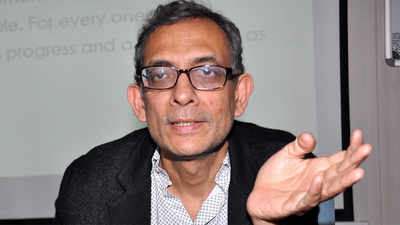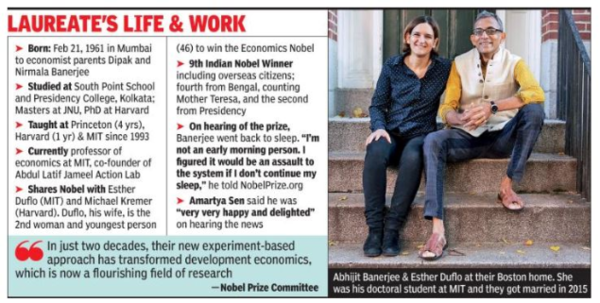- News
- India News
- India’s A+ in economics: After Amartya, it’s Abhijit
Trending
This story is from October 15, 2019
India’s A+ in economics: After Amartya, it’s Abhijit
Mumbai-born, Kolkata-bred economist Abhijit Banerjee – an alumnus of JNU – will share the 2019 Nobel Prize in economic sciences with his colleague and wife Esther Duflo and fellow researcher Michael Kremer for their groundbreaking experiment-based research into how to reduce global poverty.

Abhijit Banerjee with his colleague and wife Esther Duflo
Key Highlights
- Abhijit Banerjee will share the 2019 Nobel Prize in economic sciences with his colleague and wife Esther Duflo and fellow researcher Michael Kremer
- The research conducted by this year’s Laureates has considerably improved our ability to fight global poverty: Nobel Prize Committee
NEW DELHI: Mumbai-born, Kolkata-bred economist Abhijit Banerjee – an alumnus of JNU – will share the 2019 Nobel Prize in economic sciences with his colleague and wife Esther Duflo and fellow researcher Michael Kremer for their groundbreaking experiment-based research into how to reduce global poverty.
“The research conducted by this year’s Laureates has considerably improved our ability to fight global poverty. In just two decades, their new experiment-based approach has transformed development economics, which is now a flourishing field of research,” the Nobel Prize Committee said in its announcement of the $ 1.1 million prize.
At 46, Paris-born Duflo is the youngest ever – and only second woman (after Elinor Ostrom in 2009) – to win an economics Nobel. She was Banerjee’s doctoral student at MIT.

Currently the Ford Foundation International Professor of Economics at MIT, the 1961-born Banerjee, born to a Maharashtrian mother and Bengali father, and Duflo are best known for anti-poverty research emphasising the use of field experiments to bring the principles of laboratory-style randomised, controlled trials to empirical economics.
MIT said they have studied a wide range of topics implicated in global poverty, including health care provision, education, agriculture, and gender attitudes. In 2003, Duflo and Banerjee (along with Sendhil Mullainathan, also from India and now of the University of Chicago) co-founded the Abdul Latif Jameel Poverty Action Lab (J-PAL), a global network of anti-poverty researchers that conducts field experiments. J-PAL works to both discern which kinds of local interventions have the greatest impact on social problems, and to implement those programmes in cooperation with governments and NGOs. Among J-PAL’s notable interventions are deworming programmes that have been adopted widely.
Much of Banerjee’s work centres on economic policies and research relating to India, particularly in the field of microfinance and financial inclusion. He was among the advisors to the Congress Party on its Nyuntam Aay Yojana (NYAY scheme), proposed ahead of 2019 general elections, which pledged to distribute cash to 20% of India's poorest families as a minimum guarantee program.
Banerjee took a dim view of the Modi government’s demonetisation move and GST implementation, and has cited them among reasons for India’s economic slowdown.
News of his Nobel win was a lightning rod for some partisan-needling in India within hours of the announcement. ''Delighted to hear that Abhijit Banerjee and Esther Dufflo have won the Nobel Prize for Economics. Richly deserved. Abhijit is a proud graduate of that much-maligned university, JNU, and his work has inspired many younger Indian scholars,'' tweeted the historian Ramachandra Guha, a trenchant critic of the current dispensation.
Prime Minister Narendra Modi congratulated Banerjee on his honor, noting in a brief tweet that “he has made notable contributions in the field of poverty alleviation”. Finance minister Nirmala Sitharaman, a fellow JNU alumnus, tweeted, “Congratulations #AbhijitBanerjee on being awarded the 2019 Nobel Prize for your contribution for easing poverty. #JNU Also wishing Esther Duflo and Michael Kremer. #NobelPrize2019”.
Banerjee’s multiple affiliations – Presidency College (Kolkata), JNU, Harvard, Princeton, MIT – allowed everyone to stake a claim to its star winning the Nobel.
“Hearty congratulations to Abhijit Banerjee, alumnus of South Point School & Presidency College Kolkata, for winning the Nobel Prize in Economics. Another Bengali has done the nation proud. We are overjoyed,” tweeted West Bengal chief minister Mamata Banerjee. Amartya Sen, also of Presidency College, and later Harvard, won the Economics Nobel in 1998.
Banerjee and Duflo also became the sixth husband-wife couple to be awarded the Nobel, although some won it together (Marie and Pierre Curie for the discovery of polonium and radium) and some won it separately in different years (Gunnar Myrdal for Economics in 1974 and Alva Myrdal in 1982 for Peace).
By some accounts, Banerjee also became only the third male who is not white to win the top prize in economics (the other two being Arthur Lewis in 1979 and Amartya Sen in 1998). Banerjee received his undergraduate degree from Presidency and a Master’s from JNU. He earned his PhD in Economics from Harvard University in 1988. He spent four years on the faculty at Princeton University, and one year at Harvard, before joining the MIT faculty in 1993.
Duflo and Banerjee are familiar academics on the India circuit and have published dozens of research papers, together and with other co-authors. They have also co-written two books together, “Poor Economics” (2011) and the forthcoming “Good Economics for Hard Times” (2019).
“The research conducted by this year’s Laureates has considerably improved our ability to fight global poverty. In just two decades, their new experiment-based approach has transformed development economics, which is now a flourishing field of research,” the Nobel Prize Committee said in its announcement of the $ 1.1 million prize.
At 46, Paris-born Duflo is the youngest ever – and only second woman (after Elinor Ostrom in 2009) – to win an economics Nobel. She was Banerjee’s doctoral student at MIT.

Currently the Ford Foundation International Professor of Economics at MIT, the 1961-born Banerjee, born to a Maharashtrian mother and Bengali father, and Duflo are best known for anti-poverty research emphasising the use of field experiments to bring the principles of laboratory-style randomised, controlled trials to empirical economics.
MIT said they have studied a wide range of topics implicated in global poverty, including health care provision, education, agriculture, and gender attitudes. In 2003, Duflo and Banerjee (along with Sendhil Mullainathan, also from India and now of the University of Chicago) co-founded the Abdul Latif Jameel Poverty Action Lab (J-PAL), a global network of anti-poverty researchers that conducts field experiments. J-PAL works to both discern which kinds of local interventions have the greatest impact on social problems, and to implement those programmes in cooperation with governments and NGOs. Among J-PAL’s notable interventions are deworming programmes that have been adopted widely.
Much of Banerjee’s work centres on economic policies and research relating to India, particularly in the field of microfinance and financial inclusion. He was among the advisors to the Congress Party on its Nyuntam Aay Yojana (NYAY scheme), proposed ahead of 2019 general elections, which pledged to distribute cash to 20% of India's poorest families as a minimum guarantee program.
Banerjee took a dim view of the Modi government’s demonetisation move and GST implementation, and has cited them among reasons for India’s economic slowdown.
News of his Nobel win was a lightning rod for some partisan-needling in India within hours of the announcement. ''Delighted to hear that Abhijit Banerjee and Esther Dufflo have won the Nobel Prize for Economics. Richly deserved. Abhijit is a proud graduate of that much-maligned university, JNU, and his work has inspired many younger Indian scholars,'' tweeted the historian Ramachandra Guha, a trenchant critic of the current dispensation.
Prime Minister Narendra Modi congratulated Banerjee on his honor, noting in a brief tweet that “he has made notable contributions in the field of poverty alleviation”. Finance minister Nirmala Sitharaman, a fellow JNU alumnus, tweeted, “Congratulations #AbhijitBanerjee on being awarded the 2019 Nobel Prize for your contribution for easing poverty. #JNU Also wishing Esther Duflo and Michael Kremer. #NobelPrize2019”.
Banerjee’s multiple affiliations – Presidency College (Kolkata), JNU, Harvard, Princeton, MIT – allowed everyone to stake a claim to its star winning the Nobel.
“Hearty congratulations to Abhijit Banerjee, alumnus of South Point School & Presidency College Kolkata, for winning the Nobel Prize in Economics. Another Bengali has done the nation proud. We are overjoyed,” tweeted West Bengal chief minister Mamata Banerjee. Amartya Sen, also of Presidency College, and later Harvard, won the Economics Nobel in 1998.
Banerjee and Duflo also became the sixth husband-wife couple to be awarded the Nobel, although some won it together (Marie and Pierre Curie for the discovery of polonium and radium) and some won it separately in different years (Gunnar Myrdal for Economics in 1974 and Alva Myrdal in 1982 for Peace).
By some accounts, Banerjee also became only the third male who is not white to win the top prize in economics (the other two being Arthur Lewis in 1979 and Amartya Sen in 1998). Banerjee received his undergraduate degree from Presidency and a Master’s from JNU. He earned his PhD in Economics from Harvard University in 1988. He spent four years on the faculty at Princeton University, and one year at Harvard, before joining the MIT faculty in 1993.
Duflo and Banerjee are familiar academics on the India circuit and have published dozens of research papers, together and with other co-authors. They have also co-written two books together, “Poor Economics” (2011) and the forthcoming “Good Economics for Hard Times” (2019).
End of Article
FOLLOW US ON SOCIAL MEDIA










